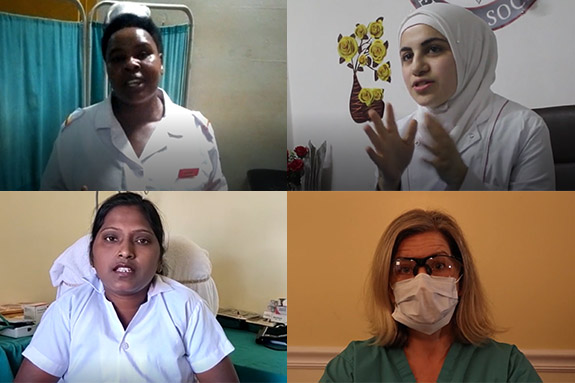
05 May Midwives Are Leaders on the Line. Listen to Them.
This blog originally appeared on the Frontline Health Workers Coalition website.
 Carol Bales is advocacy and policy communications manager at IntraHealth International, where she also leads communications for the Frontline Health Workers Coalition. Elizabeth Walsh is director of communications and knowledge management for HRH2030, based at Chemonics.
Carol Bales is advocacy and policy communications manager at IntraHealth International, where she also leads communications for the Frontline Health Workers Coalition. Elizabeth Walsh is director of communications and knowledge management for HRH2030, based at Chemonics.
Midwives save moms’ and babies’ lives, and provide essential services like family planning, every day.
“From antenatal care to delivery… to disease prevention and treatment,” says S. Bakhla, an auxiliary nurse-midwife in India, “ I am always prepared to serve the community.”
When educated and regulated to international standards, midwives can provide 87% of essential care. And, with increased investment, midwives could prevent over 80% of all maternal deaths, stillbirths, and neonatal deaths.
But midwives are too often undervalued and not able to achieve their full potential. They have the skills to lead teams of health workers toward universal health coverage, but need more opportunities. And now during the COVID-19 pandemic, midwives are on the front lines as they continue to deliver prenatal and maternal services (and more). With every woman and baby they care for, midwives are putting themselves on the line, at personal risk to themselves and their families.
Last month, for World Health Worker Week, the Frontline Health Workers Coalition and the USAID-funded HRH2030Program asked frontline health workers to submit videos telling us what it’s like to be leaders on the line and how to better support them. Hear how midwives from across the globe responded.
Fatima Karraf, a nurse-midwife student in Syria, suggests four ways to encourage more midwife leaders, including motivating midwives and giving them the resources they need.
Juliet Cherop, a registered midwife in Uganda, advocates for additional support for midwives during the pandemic, specifically protective gear, essential medicines, and risk benefits.
Sage Macleod, a nurse-midwife in Connecticut, says she sees the effect the pandemic is having on pregnancy and birth for her patients. She urges people to stay home, to protect themselves and all of us.
Support midwives now
Throughout 2020: The Year of the Nurse and the Midwife, we’re joining the call to strengthen opportunities for midwife and nurse leadership. Nurses and midwives are already leaders in their communities, facilities, and the health care system but are not adequately represented in leadership roles where they can guide health policy and investment. We must foster additional health worker leadership by increasing access to leadership training, skills-building, and mentorship programs and addressing gender inequalities in leadership opportunities.
The Frontline Health Workers Coalition and members—including Chemonics International, which implements the HRH2030 Program with a consortium of partners—is pushing the US and other countries and donors to increase investment in nurses and midwives—including to train and employ nine million more nurses and midwives needed in areas of least access.
We’re also asking the US and other countries and donors to empower nurses and midwives to work to their full potential to reach health for all. That includes building their self-confidence and sense of preparedness to assume leadership and increasing access to professional networks and mentoring. Learn more in this report by several members.
And the Frontline Health Workers Coalition is urging all health policymakers to urgently address issues critical to midwives and other frontline health workers’ safety, and not to restrict procurement of personal protective equipment and other supplies needed by health workers in low- and middle-income countries.
Address the gender issue
In many countries around the world, the contributions of midwifery are dismissed because of the professions gendered nature: midwives are mostly women and they serve women. It is long past time to overcome this limited view. Coalition members and other advocates for midwife leaders, including Roopa Datt, executive director of Women in Global Health, have put forth solid solutions to progress past these gender barriers.
Roopa stresses that women health workers, especially nurses and midwives, should be part of every decision-making body. And that countries need both gender-equitable and gender-responsive health systems that factor in the needs of men and women, particularly that women make up the majority of the health workforce, including the midwifery workforce.
On International Day of the Midwife and every day, we urge decision-makers around the world to hear the voices of midwives and other frontline health workers. Their perspectives are invaluable. Their needs and ideas should be heard and acted on.





